The Soccer Fields of Fallujah
On September 15, 2003, the search for the weapons of mass destruction in Iraq was really not going well. US Secretary of State Colin Powell made a symbolic trip to Iraq to visit the town of Halabja, where an estimated 5,000 Kurdish villagers were killed.
Powell's three-hour visit to this town near the Iranian border, which required him to fly in an airborne convoy of UH-60 Blackhawk and AH-64 Apache Longbow attack helicopters, brought him face to face with scores of Iraqi Kurds who praised the U.S. invasion and held aloft signs lauding President Bush. Although the sentiments appeared to be genuine, they were far more ebullient than those generally expressed by Iraqis in parts of the country Powell did not visit.
"Today it is perplexing and rather painful indeed for the people of Halabja to hear voices in the international community that continue to insist on proof for Saddam's weapons of mass destruction," said Barham Salih, the prime minister for the western part of Iraq's Kurdish enclave. "Here is the proof. Halabja is the proof. . . . This mass grave in Halabja and the other 170 so far discovered mass graves in Iraq should dispel any doubts about the legitimacy of the American and British liberation of Iraq. These mass graves vindicate the moral imperative of your intervention to protect the people of Iraq."
Standing at the mass grave site in front of rows of gravestones aligned in prefect diagonals with the precision of a military cemetery, Powell said the world "should have acted sooner" after the massacre. But he said the toppling of Hussein would prevent such atrocities from occurring in the future.




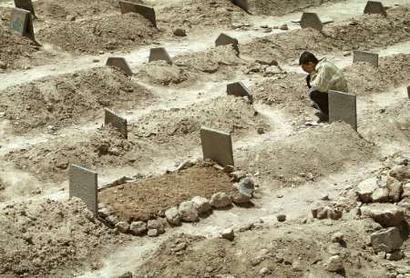




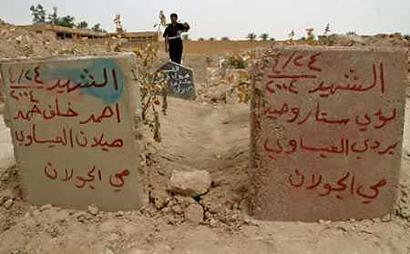


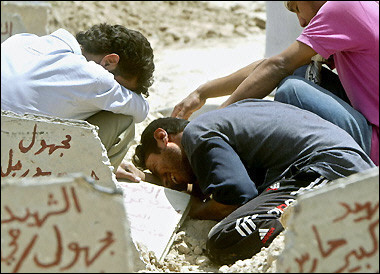
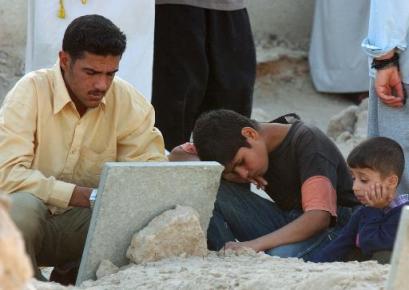
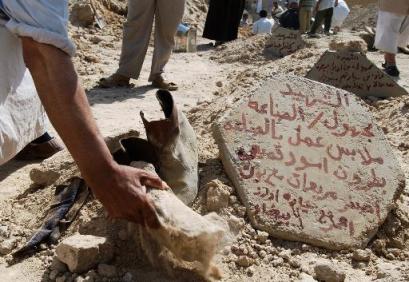

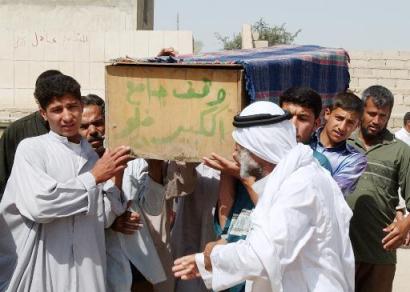


More than 600 Iraqis have been killed in Fallujah since Marines began a siege against Sunni insurgents in the city a week ago, most of them women, children and the elderly, the head of the city's hospital said Sunday. Statistics and names of the dead were gathered from four main clinics around the city and from Fallujah General Hospital, said hospital's director Rafie al-Issawi.
Bodies were being buried in two soccer fields, one of which was visited by an Associated Press reporter. It was filled with row after row of graves.
The death toll from the siege, which started early last Monday, may be even higher than the hospital's tally. "We have reports of an unknown number of dead being buried in people's homes without coming to the clinics,'' al-Issawi said.
Asked about the report of 600 dead, Marine Lt. Col. Brennan Byrne said: "What I think you will find is 95 percent of those were military age males that were killed in the fighting. The Marines are trained to be precise in their firepower .... The fact that there are 600 goes back to the fact that the Marines are very good at what they do,'' he said.
A day earlier, Byrne, commander of the 1st Battalion, 5th Marine Regiment, said his battalion - one of three in or around the city - had confirmed 40 Iraqi insurgents were killed and 19 others were likely dead throughout the entire campaign.
Residents started burying bodies in the soccer fields starting Friday, when there was a pause in fighting to allow people to tend to the dead. At one of the fields, which residents dubbed the "Graveyard of the Martyrs,'' an AP reporter saw rows of freshly dug graves with wooden planks for headstones over an area about 30 yards wide and 100 yards long. Some headstones bore the names of women; others had markings indicating the dead were children.
Khalaf al-Jumaili, a volunteer helping bury bodies, said more than 300 people had been interred in the field. Other volunteers were seen carrying bodies in blankets and lowering them into graves while bystanders shouted, "Martyr, martyr!'' It was not known how many were buried at the other soccer field.
Asked Sunday about the number of Iraqi casualties in Fallujah, Brig. Gen. Mark Kimmitt referred reporters to Marine spokesmen. But he insisted Marines are "tremendously precise'' in their operations and suggested insurgents were hiding among civilians, causing civilian deaths.
To borrow the words spoken at Colin Powell's visit to Halabja, substituting Fallujah for Halabja, "This mass grave in Fallujah should dispel any doubts about the legitimacy of the American and British liberation of Iraq. These mass graves vindicate the moral imperative of their intervention to protect the people of Iraq."
(The
Observer)
Standing at the open slit trench, one of five in Falluja's newest cemetery, Mustafa asks: 'Would they do this in New York or California?'
A sign nearby reads 'The Olympiads, Champions of Champions', the motto of Falluja's football team. This was their stadium, rows of cinderblock seats overlooking a dusty field. Beside one of the 50-yard trenches, sit a pair of Sunshine high-top sneakers, heavy with rotting blood and flies.
Fresh red paint on slabs of cement portray the city's recent history. 'Martyr, unknown, only bones', reads one grave marker. Another 'Martyr, unknown, White Opal license 31297, Baghdad, Iraq,' and in the same grave 'Shahida [female martyr], headless, found beside Saad Mosque.'
'All these people were killed because of four dead American soldiers,' says Mustafa before ducking into a corridor to a smaller enclosure behind the field. This was the original makeshift cemetery before the dead overflowed into the football pitch - we lose count after 100.
'Snipers,' says Mustafa when he hears shots. Above, US jets fly low, followed by a loud explosion somewhere in the city. 'Bomb,' says Mustafa.
...
Mustafa Hamid, a 22-year old student in a nightshirt-like dishdasha, wandered into the football field on Friday afternoon. Iraqi police and soldiers stood in groups along the main road. But in the back streets resistance fighters move about, one of them in a commandeered police car. As Mustafa talked, a fighter rode up on a bicycle, a Kalashnikov over his shoulder. Wrapping a scarf around his face, the young Mujahiddin, as they call them now in Falluja, begins asking questions about foreigners.
What will happen to fighters like this one is still unclear. The resistance is an unknown, almost uncontrollable, collection of fighters oblivious to the ceasefires that have come and gone. Perhaps Iraqi negotiators and soldiers can control them, perhaps not.
It is difficult to gauge the support of the people of Falluja for men like him but after three weeks of fighting many complain privately they are tired of the Mujahideen. But hatred of the Americans seems universal.
'The Americans are killing people who had nothing to do with the death of those four soldiers,' says Mustafa referring again to the US security contractors killed and dismembered at the beginning of April. The deaths were the ostensible reason for the attack on a city which US army spokesman General Mark Kimmit famously described as 'not getting it'.
In fact, it was the US army that never really 'got' Falluja, militarily or culturally. For over eight months, it has been beyond their control, caught up in a cycle of violence that began on 28 April last year, when 17 Iraqis were killed by US soldiers during a protest. Casualties mounted after September, rising dramatically each time a new US army unit arrived. By the time the Americans decided to assert themselves, local tribes, religious leaders and, perhaps, foreign fighters, were well supplied and waiting. Now the Americans have left a traumatised, angry city.
There are no victories in Falluja. The Marines' initial incursion into its industrial zone at the start of the fighting deprived the resistance of weapon stocks, which were soon replenished. After more than 20 years of Saddam's wars, Iraqis know how to fight, especially in Falluja, birthplace of many of Iraq's army officers.
Everybody we talked to in Falluja had stories about snipers. In some neighbourhoods, stepping outside meant certain death. Residents said Americans used the minarets towering over Falluja, known as 'the City of Mosques'. The US army accused the resistance of doing the same.
Like the graveyard, the hospital reveals a lot about what has happened. At the beginning, the main hospital across the river was cut off and doctors moved into three small clinics. During the initial fighting, most wounded civilians came in with what Dr Mohammed Samarae describes as 'multiple blast wounds - lost limbs, abdomens blown open,' the result of shelling when much of the population were trapped in their houses.
'After that, almost all the casualties were head and chest wounds from snipers,' said Samarae. 'Ninety per cent of the injured were civilians - children, old people, women - the fighters take their medicine and leave. The characteristics of the wounds suggest they are American-inflicted. We have had a lot of experience of American weapons in the past year.'
On Friday there had been no injuries, but the day before three civilians were brought in with gunshot wounds. According to the records, 219 dead had been taken to the clinic as well as 471 wounded. Many bodies are still uncollected, and others have been buried in gardens. Casualty figures are often underestimated, by as much as 40 per cent, according to Iraqis who carried out surveys following the war, because Islam requires an immediate burial.
Outside the hospital, Samarae points to the parking lot which served as temporary morgue: 'Sometimes we had whole families lying here.'
(E&P) Latest from McClatchy's Iraqi Staffers: The 'City of Cemeteries' June 15, 2007.
For several weeks, E&P has been featuring frank and often disturbing blog entries by McClatchy's Iraqi correspondents and staffers from their site, Inside Iraq. The writers' full names are not listed due to security concerns.
Here is the latest, on the continuing crisis in Fallujah, from a frequent poster, correspondent "Dulaimey."The following is too long to read but I beg you; please save five minutes of your time and read it.
After the invasion in 2003 the city of Fallujah is not any more known to Iraqis as the city of the best Kabab in the country or the city that has one of the few Iraqi beautiful tourism cities or its many mosquesÖ it is known for resistance and terrorism.
Dramatic changes took place in the city. The city prefers to ally with the American troops rather than with Al Qaeda.
The city is under siege. You can not go in only through certain checkpoints with a badge issued by the marines. The main soccer field in the city is now a cemetery. The only amusement park in the city was looted and destroyed; its trees were used by the locals to bake their bread. Now the former amusement park is intended to be the next cemetery.
Instead of being the city of mosques it will be the city of cemeteries and this will be another achievement of the invasion that residents of Fallujah will remember through generations. Please donít let that happen. Donít give extremists more arguments and evidences to fuel anger and to deceive and recruit young men with them.
It can be avoided by allowing the residents to bury their beloved in the northern east cemetery through Al Sichir checkpoint (as locals call it). Just move that check point 300 meters away and then it is solved.Restore cell phones. Take a bold action and bring cell towers to the American camps or provide security to the existent ones so Al Qaeda wonít attack em. Prove to the people that you can do things right.
People can not understand how great armed forces, like the U.S.army and marines, can not help restoring electricity, water not even cell phones so people can cooperate with the authorities at least.Please donít let the people remember your country in this way; making cities full with cemeteries more than it is already (some people in Fallujah buried their sons in their home gardens in 2004).
It is unfair to my people in Fallujah. It is unfair thing to do to the mothers of the soldiers who thought that they are sending their beloved sons to help millions of Iraqis. It is unfair thing to do to the good American citizens that I knew and met.
Please help not to change the name of Fallujah to the city of cemeteries.
The city, for the last three weeks and still, is under vehicles curfew. Students walk for long distances to do their final exams. Can you imagine the heat over here in Fallujah? It is about 130 F. patients, pregnant women and old men who can not walk. Add to that those who have to earn some money for their families.
You will ask me why the people donít demonstrate and demand their rights. My answer is:
The city is under marshal laws and people have to demonstrate by the approval of the military, which is not approved usually. And the most important reason the people here still remember what happened in April 2003, when two demonstrations were faced by fire and led to all these problems. People are afraid and oppressed by every one; Al Qaeda is killing them, the Shiit- led government look to them as Sunnis not Iraqis, the Americans look to them as Saddam loyalists and their bitter enemy.
Will some one please look at them as humans?
Why the military can not allow people to enter the city freely like any other place in the world? In a prison you can enter but you can not leave. In Fallujah you can not enter and you can not leave.Let them leave the checkpoints in place if they think it must but make it easier. Donít issue that racist badge?
When the southern Iraqi provinces raised against Saddam in 1991 he didnít issue them badges that say they are residents of that certain city and can not enter to that city unless they carry it not even for Kurds not even for Ramadi residents after 1994 incidents. This badge is bad to the limit that even Saddam was shy to make it.
We became third degree citizens in this country because of Al Qaeda, Americans and Iranian backed government.
I donít care about tribes, sheikhs, fighters, smugglers or insurgents. All what I care about are the widows who lost their supporters, orphans who lost their parents and patients who can not leave the city unless they walk for miles and can not come back unless they carry that stupid badge.
Please help these people for the sake of any thing that you believe in whether it was God, a tree, oil or above all humanity sake.
Please send this to any politician, congressman and any one who can help these people. They are suffering more than the most of others.
Help giving these people some hope.